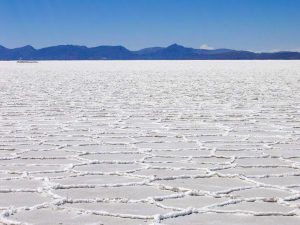Jul 26.07.2019, XNUMX - Important agreements with major powers such as Russia, China, India and Germany in connection with the industrialization of lithium and petroleum products bring Bolivia to the international stage today, said economic analyst Miguel Angel Marañón.

Salar Uyuni A huge salt lake in Bolivia is considered one of the largest lithium reserves in the world
Since the natural gas industry was successfully nationalized after the takeover of Evo Morales, government revenues have increased considerably. At the same time, the customs and tax authorities were strengthened, so that also from this side, a multiple of revenue to go to the state. Exports have increased tenfold over the 2000-2013 period, and extreme poverty has been greatly reduced, and hence inequality. With higher growth and stable monetary policy compared to most other countries in the region, Bolivia's population today (2017) has a standard of living comparable to many other countries in the region.
An important factor in the meantime was also the treaty of the peoples (Spanish: Tratado de Comercio de los Pueblos (TCP)), which on 29. April 2006 was signed by the presidents of the countries Bolivia, Venezuela and Cuba. In this agreement, Venezuela and Cuba commit to buy Bolivian soybeans and support Bolivia in its programs for literacy and health care and in the establishment of a national Bolivian airline. To this day, these three countries maintain close economic and diplomatic relations.
Marañón highlighted the investment of the German company ACI Systems for the development of the third phase of the industrialization of lithium with approximately 1,3 billion US dollar in Uyuni. ACI Systems Alemania is a member of the Zimmer ob Rottweil-based ACI Group. The group is engaged in innovative and sustainable production solutions for the photovoltaic, battery and automotive industries.
The Chinese company Xinjiang Tbea Group-Baocheng also invested around 300 million in the Coipasa (Oruro) salt flats. A company that is well represented in the renewable energy sector.
He recalled that during Indian President Ram Nath Koving's visit last March, New Delhi's interest in participating in strategic projects related to soft metals was expressed and 13 billion dollars available for investment in the oil and gas sector stood.
President Evo Morales met at the 11. July with his Russian counterpart Vladimir Putin and signed several contracts, such as the sale of Bolivian natural gas for 20 years by the company Acron from 2023 and the export of fertilizers from the plants of Bulo Bulo and the Brazilian Tres Lagunas in partnership with the state Bolivian Fiscal Oil Fields.
Marañón said that these arrangements are not coincidental, as they are the result of the economic policies that Morales introduced in Andean Amazonas 13 years ago in order to find strategic partners who do not impose conditions and negotiate at par.
'Participating in markets like Russia (with more than 130 million inhabitants), China (with more than 1.300 million inhabitants) and India (more than 1.000 million inhabitants) offers the Bolivian state an enormous opportunity, not only state but also private Make investments. It's about entering gigantic markets with enormous economic potential.
The growth, economic stability and solvency of Bolivia make the country appear like a "serious partner" for other countries and international corporations.
In Bolivia, 2005 recorded gross domestic product (GDP) growth of 784 million dollars, which increased to 2006 billion dollars thanks to the implementation of the model proposed by President Evo Morales since 40,5.
Institute for Rare Earths and Metals Arndt Uhlendorff - July 2019
